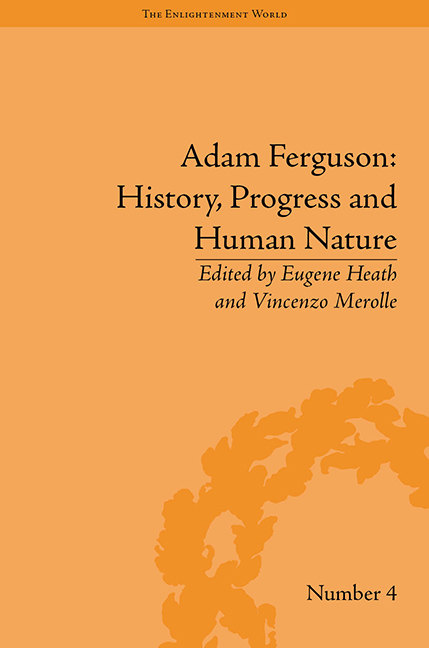Book contents
- Frontmatter
- CONTENTS
- Contributors
- Introduction
- I Life and Works
- 1 Ferguson's Epistolary Self
- 2 Ferguson and Scottish History: Past and Present in An Essay on the History of Civil Society
- 3 Ferguson's Use of the Edinburgh University Library: 1764–1806
- II In History
- III On History
- IV Human Nature, Action and Progress
- Notes
- Works Cited
- Index
2 - Ferguson and Scottish History: Past and Present in An Essay on the History of Civil Society
from I - Life and Works
- Frontmatter
- CONTENTS
- Contributors
- Introduction
- I Life and Works
- 1 Ferguson's Epistolary Self
- 2 Ferguson and Scottish History: Past and Present in An Essay on the History of Civil Society
- 3 Ferguson's Use of the Edinburgh University Library: 1764–1806
- II In History
- III On History
- IV Human Nature, Action and Progress
- Notes
- Works Cited
- Index
Summary
Adam Ferguson has always provided a face for every occasion. To some he is a pioneering theorist of ‘civil society’, a concept (or, rather, body of concepts) that he developed in important new ways to which latter-day exponents like Ernest Gellner have found it easy to relate. To others, writing in the wake of William Lehmann and Ronald Meek, he is a founder of academic social science, by turns an early sociologist and an anthropologist. To yet another audience, he belongs, along with his friends Adam Smith and David Hume, to the grand tradition of classical political economy. Accordingly An Essay on the History of Civil Society is, depending upon one's own tastes, either an early exposition of historical materialism, replete with warnings about the effects of ‘alienation’ consequent upon the ‘division of labour’ (an interpretation traditionally favoured both by certain sociologists and by most Marxist readers), or else a notable staging post on the high road to the ideals of free-market liberalism (the view of political philosophers such as Friedrich Hayek). For still others, particularly among recent historians of political thought, he is a leading representative in eighteenth-century Britain of the classical republican or ‘civic humanist’ tradition, effectively linking the ideological concerns of the ancient city-states directly with those of modern commercial society. And this, of course, is to say nothing of yet other roles in which Ferguson can plausibly be cast – his position, for example, as a best-selling historian of Rome, one of Edward Gibbon's most talented eighteenth-century colleagues; his long and influential career as a teacher and writer on moral philosophy, in which he shaped minds as important as that of Dugald Stewart; or even, as a nonagenarian, his slightly melancholy position as the last relic of the Enlightenment, friend of the young Walter Scott and, wrapped against the Scottish winter, Henry Cockburn's fondly remembered ‘philosopher from Lapland’.
- Type
- Chapter
- Information
- Adam FergusonHistory, Progress and Human Nature, pp. 23 - 38Publisher: Pickering & ChattoFirst published in: 2014



